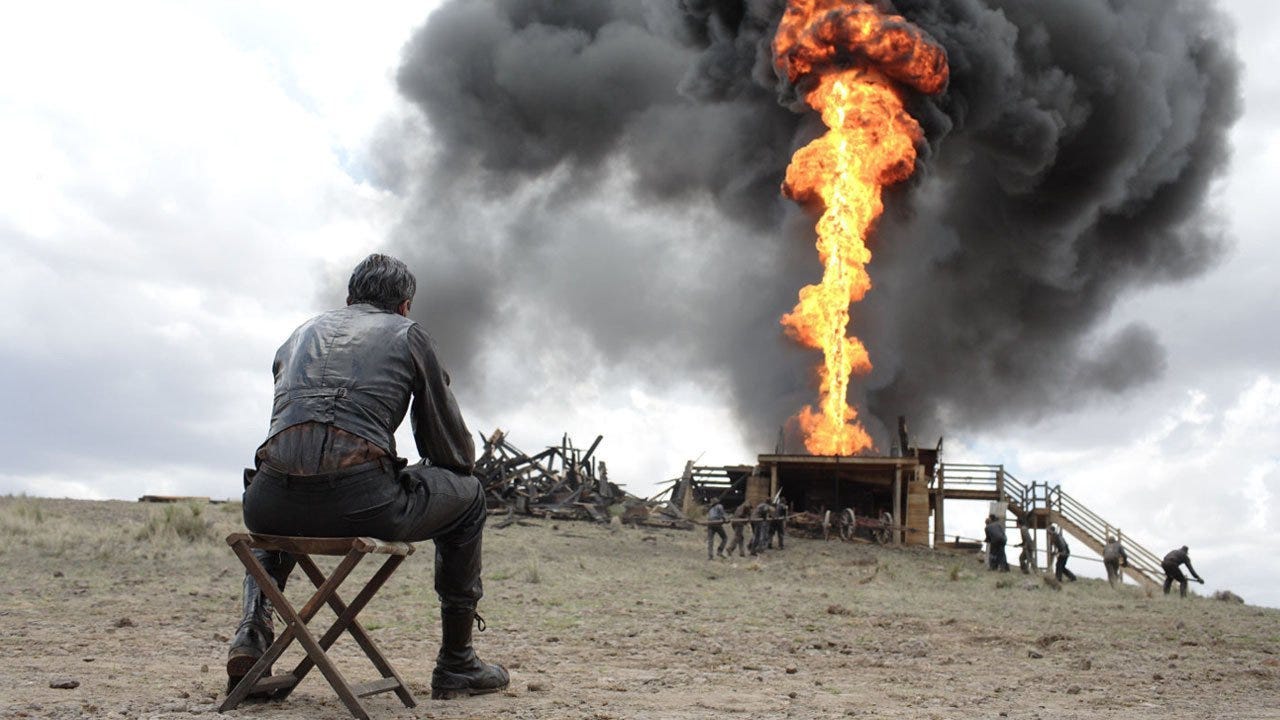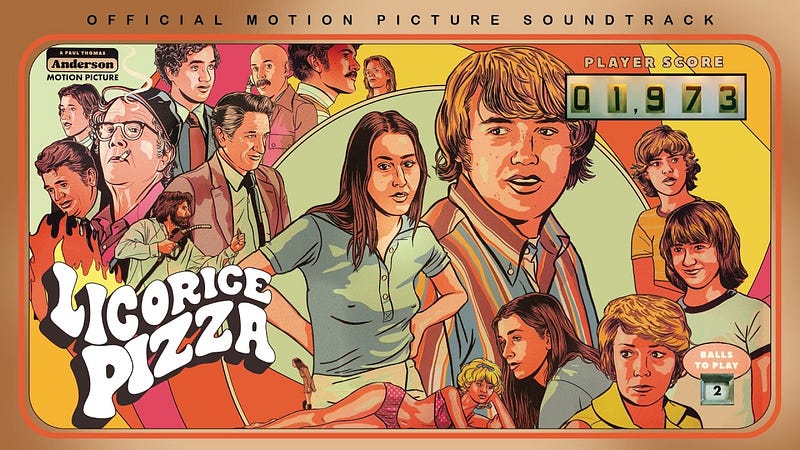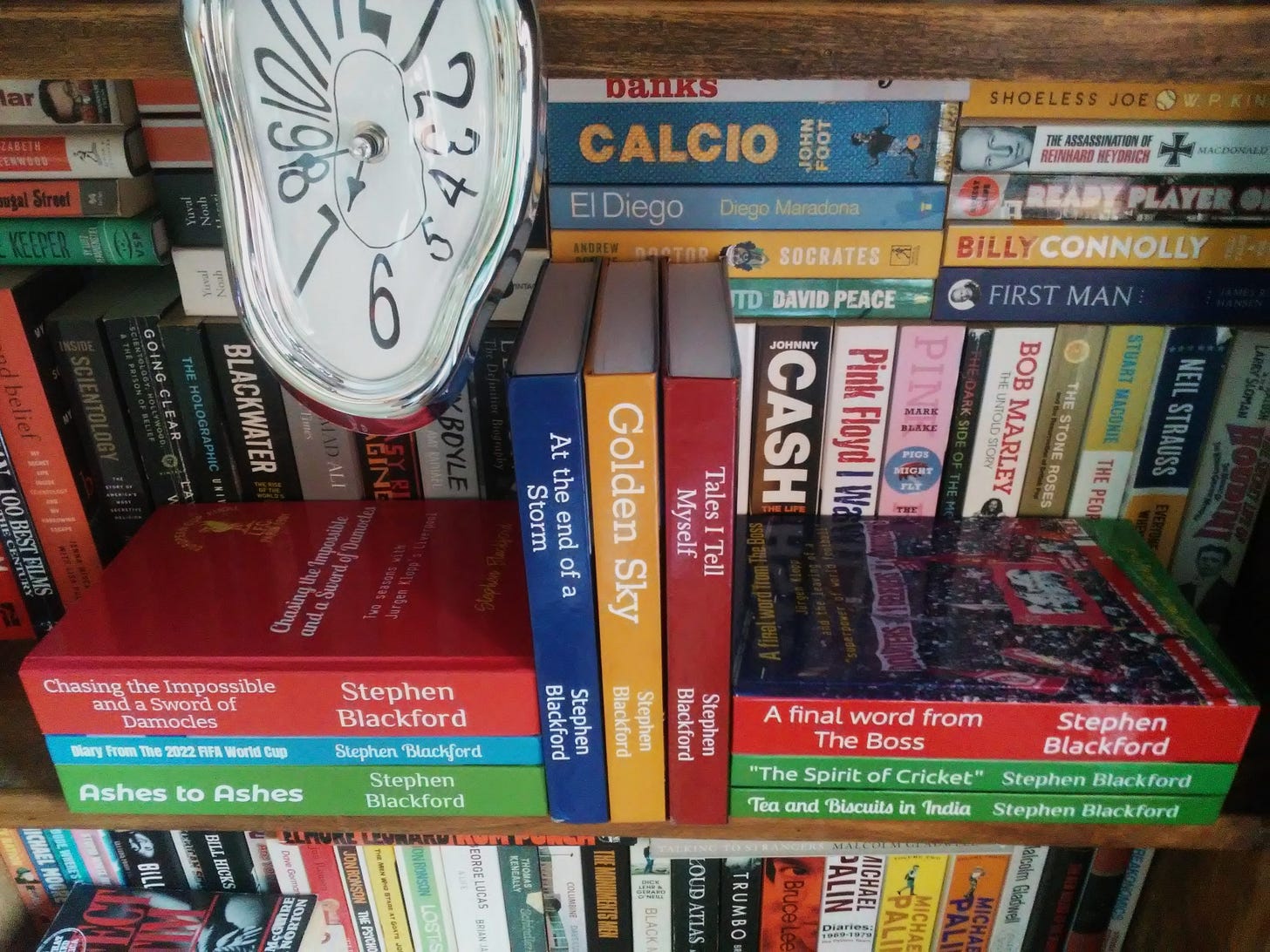
In the seventeen years since the release of this double Oscar winning film (and 140th on the www.imdb.com chart of the 250 greatest films of all time), Paul Dano would follow his snake oil salesman routine here with an even darker and sinister turn in the Denis Villeneuve directed Prisoners as well as star roles in Rian Johnson’s Looper and Steve McQueen’s 12 Years a Slave before recently taking a turn for the macabre and madness of “The Riddler” in the DC Universe version of The Batman. Ciaran Hands, everyone’s favourite consiglieri, would go on to work with directors of the golden generation: from Martin McDonagh to Martin Scorsese, David Yates to Tomas Alfredson and Kevin J O’Connor would re-team with the director of There Will Be Blood here, Paul Thomas Anderson, on his 2012 masterpiece, The Master.
I note this purely because all three actors have or have become firm favourites of mine and whilst Daniel Day Lewis has won a further Oscar in addition to his Oscar winning performance here, and only starred in one further film and only through to the persistent nagging of Paul Thomas Anderson to work together again, co-star and on screen son here in the guise of Dillon Freasier, has never, ever worked again as an actor, and his one and only acting credit resides here with There Will Be Blood.
There’s a slice of film trivia for you and your back pocket for your next pub quiz! Another is the film’s final two words “I’m finished!” and if you haven’t seen this film yet you won’t believe the majestic ten minutes leading up to these final two words!
“Just give me the blood, Eli”
At 158 minutes, this is a slow burning (pun intended) modern classic that again has relationships, human angst and emotion as its central driver of the narrative. There is a constant juxtaposition of three main relationships, Father and Son, Oilman/Workers and Oilman/Faith Healer, with Daniel Day-Lewis starring and lighting up the screen as “Daniel Plainview” in a career best performance. He is on screen for virtually the entire film and dominates every scene with a brooding intensity that borders on majestic. Protective of his only son “HW” (Dillon Freasier) who, as the youngest member of the cast is flat out brilliant and who may/may not be biologically his. The juxtaposition continues with Daniel’s fierce determination to embrace workers and villagers as a family unit, but ultimately to ensure his own financial gain in the emerging market for oil.
Five minutes pass before the first word is uttered, a despairing “No” from Daniel Plainview as he falls into an oil well, to fourteen minutes in total when he makes his famous address to a collection of prospective investors and land owners:
“Ladies & Gentleman, I’ve travelled over jist about half of our state to get here this evenin’. I couldn’t get away sooner, because my new well was a-comin in at Lobos River, and I had to see about it. That well is now flowin’ four thousand barrel, and payin’ me an income of five thousand dollars a day. I got two others drillin’, and I got sixteen producin’ at Antelope.
So, Ladies and Gentlemen, if I say I’m an oil man, you got to agree”.
The first fourteen minutes, devoid though they are of any real speech, are saturated in dark, brooding colours, vast landscapes and deep early 20th Century oil wells. Covering the end of the 19th Century through the early 1920’s, this is a depiction of a boom time in America, the influx of oil and the start of one of the largest industries in humankind. The three contrasting relationships are all highly developed (as are other narrative strands omitted here for fear of spoilers) however the three major relationships soon become the centrepiece of this fantastic film, with Day-Lewis’ portrayal of love and devotion to his son and co-workers sharply focussed by his snarling antipathy toward “Eli Sunday” (Paul Dano) and his religious prophecies.
Dano produces a startling central performance of subtle innuendo and over the top suggestion with seemingly no middle ground which is a great testament to an actor matching the majestic performance from Day-Lewis. With “Paul Sunday” offering his family’s land at a cut price, Daniel and his son visit the family farm to meet with Eli Sunday and the extended family, from thereon in the juxtaposition between the two very opposite characters of Daniel and Eli take centre stage. The pair share incredible screen time together, and I’ve dissected just one incredible scene below, following a very short premise to set the scene:
Daniel, continually tolerant yet reluctant to accept Eli’s “Church of the Third Revelation” is forced to repent for his sins in order to finally secure leasing rights to the land of “William Bandy” (Hans Howes). Despite repeated offers of more money to Bandy, there is only one way: “be washed in the blood of Jesus Christ”.
Eli, shot from below to ensure the illuminated cross is directly behind and above him calls out for a sinner needing redemption, and a “new member”. This is the start of a truly wondrous portrayal of righteous anger and force from Paul Dano as his character Eli continues to push for the new member to make himself known to the congregation. Cutting between Eli and Daniel, looking down and not wanting to catch Eli’s eye line, he eventually raises a hand and walks slowly towards the stage, before standing directly underneath the illuminated cross.
“We have a sinner with us here who wishes for salvation!”
Ordering Daniel to his knees, Eli circles him, his righteous anger growing with every step, as does Dano’s performance, imploring Daniel to confess louder and louder “I am a Sinner”. Always looking down, Daniel repeats Eli’s words as he circles him, softly and often indistinctly as Eli continues to circle and implore him to speak up and shout for the forgiveness of his sins. Shouting now, and forcibly so both at Daniel and the congregation, Eli forces Daniel to repeat “I was lost but now I am found” before Daniel, finally looking up and boiling over with frustration seeks an end to the baptism. We cut now between extreme close ups of both men, both with anger and frustration prevalent as Eli circles Daniel once more before fiercely slapping Daniel’s face numerous times before grasping his forehead and expelling the “demons” and “ghosts”. Daniel is finally baptised and with an extreme close up on Daniel exclaims softly “There’s a pipeline” before rising to his feet and shaking Eli’s hand with a forced smile. Whilst doing so, Daniel says something indistinct to Eli which visibly shocks him before Daniel is welcomed by the congregation and re-takes his seat. A short, but powerful scene brilliantly depicted by two powerhouse performances from Day-Lewis and Dano.
In addition to the central powerhouse performances already noted, there are further superb supporting roles from a brilliant Sydney McCallister as “Mary Sunday”, with her father “Abel Sunday” played by David Willis. Kevin J O’Connor plays the mysterious role of “Henry” brilliantly, his eyes forever darting across the screen and a special mention of praise is devoted to Russell Harvard who plays the adult “HW” with a charm and real beauty.
Ciaran Hinds also excels with minimal dialogue as Daniel Plainview’s trusted confidant “Fletcher”.
The character of the film is evident from those first fourteen minutes. No dialogue, all exposition and stunning cinematography from the genius that is Robert Elswit. Very few films could get away with a dialogue free opening such as this, slow, dark and foreboding with a minimal score (see below) it’s a great credit to the wonderful directing and story telling skills of Paul Thomas Anderson that as an audience you go with this. Perhaps it’s because you get a real sense that every scene has been meticulously planned to the nth degree, from the wide angled vistas to the brooding menace of Day-Lewis’ performance to the story being told. With the very brief outline of the opening fourteen minutes and the brief baptism scene I have perhaps given 5% of the total film here. The remaining 95% is a pure and utter joy. Unsettling, a sense of foreboding mixed with triumph, anger and rage. Of love, friendship, loss and regret. All common, regular themes of a PT Anderson film and all magnificently told here.
Written and directed by Paul Thomas Anderson based on Upton Sinclair’s novel “Oil”, it deservedly gained Oscars recognition in 2008 with eight nominations and two successes, with both Daniel Day-Lewis (Best Actor) and Robert Elswit (Best Cinematography) deserved winners.
And for Radiohead fans you have the very real treat of Jonny Greenwood providing a haunting, beautiful and melancholic film score throughout, with the soundtrack alone again highly recommended. Whilst not usual Radiohead fare by any means, Jonny’s score is wonderful, mixing his own creations with that of existing pieces such as the joyous “Concerto for Violin and Orchestra in D Major” which accompanies the end credits. Many tracks such as “Convergence”, “Open Spaces”, “Henry Plainview”, “HW/Hope of New Fields” and the title track “There Will be Blood” perfectly encapsulate this film, full as they are of foreboding, yet haunting beauty. The film befits this, as it is yet another hauntingly beautiful film from a brilliant cinematic Director.
“There Will Be Blood” can also be found within my 7 volumes of “Essential Film Reviews Collection” on Amazon with each and every volume free to read should you have a Kindle “Unlimited” package. All 9 of my self-published books can also be read for free on Kindle (but go on, treat yourself to a paperback or hardback version!) and should you watch my short Youtube video linked in the middle of this article you’ll also find links to my Patreon and Buy Me A Coffee and other ways of supporting my work as an independent writer.
"The Essential Film Reviews Collection VOL.1" - link to Amazon
Thanks for reading. I hope this message in a bottle in The Matrix finds you well, prospering, and the right way up in an upside down world.











